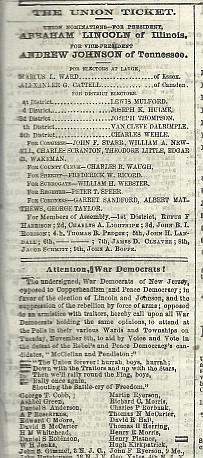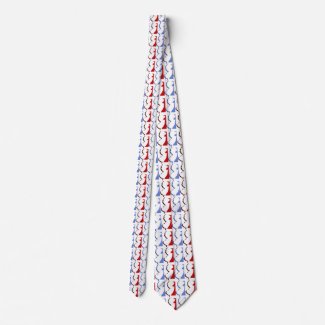History-- New Jersey and the Civil War
|
* Home
* History * Population * Government * Politics * Lobbyists * Taxes * State Symbols * Biographies * Economy * Employers * Real Estate * Education * Recreation * Restaurants * Hotels * Health * Environment * Stadiums/Teams * Theaters * Historic Villages * Historic homes * Battlefields/Military * Lighthouses * Art Museums * History Museums * Wildlife * Climate * Zoos/Aquariums * Beaches * National Parks * State Parks * Amusement Parks * Waterparks * Swimming holes * Arboretums More... * Gallery of images and videos * Fast Facts on key topics * Timeline of dates and events * Anthology of quotes, comments and jokes * Links to other resources |
* Native Americans * Exploration and Settlement * British colony
* Royal governance * Path to Revolution * Revolutionary War * Industrialization * Civil War * Post-War Economy & Reform * Woodrow Wilson as Governor * World War I & 1920s * Great Depression * World War II * Post-War Development * 1960s & Richard Hughes * 1970s & Income tax * 1990s-Whitman & Florio * 9/11 & McGreevey Administration * Christie & Corzine * Chris Christie * Phil Murphy 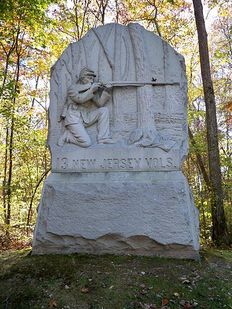 Monument to the 13th New Jersey Volunteers at Gettysburg. Image: Wikimedia Commons/Fyre23 Monument to the 13th New Jersey Volunteers at Gettysburg. Image: Wikimedia Commons/Fyre23
-- Regional conflict in 1850s
As tension increased in the country over the issue of slavery, New Jerseyans became increasingly divided over the course that the state should take in the event that the Southern states left the Union. Rodman Price, who served as governor from 1854 to 1857, argued for New Jersey's supporting the South even to the point of joining in any movement to secede, with his faction of the Democratic Party coming to be known as Copperheads. -- Attitudes toward slavery and secession Writing in 1861 after he left office, Price urged New Jerseyans to recognize their economic self-interest: "If we…remain with the North, separated from those who have, heretofore, consumed our manufactured articles and given employment to a large portion of our labor, …our commerce will cease, European competition will be invited to southern markets, our people be compelled to seek employment elsewhere, our state becoming depopulated and impoverished….Whereas to join our destiny with the South will be to continue our trade and intercourse--our prosperity, progress, and happiness--uninterrupted and, perhaps, in an augmented degree. Who is he that would advise New Jersey to pursue the path of desolation when one of prosperity is open before her…". Words that Make New Jersey History: A Primary Source Reader by Howard L. Green (1994) In addition to the economic interests cited by Price, many New Jerseyans also saw the South's stand in defense of states’ rights as compatible with their own long-standing fear of dominance by the larger states. Among the northern states, New Jersey also had pursued rather ambivalent public policies relating to slavery. Slaves had initially been key sources of labor for New Jersey farmers, and ports like Perth Amboy were sites for slave markets. By 1800, there were some 12,000 slaves in New Jersey, nearly six percent of the state's total population. In 1804, New Jersey became the last northern state to abolish slavery when the Legislature enacted the Gradual Manumission Act, which slowly phased out slavery by making slave children who were born after 1804 free when they reached the age of majority, but allowed older slaves to continue in bondage. As late as 1860, there remained 18 slaves in New Jersey, along with 25,336 free Africans in the state population of 646,699. 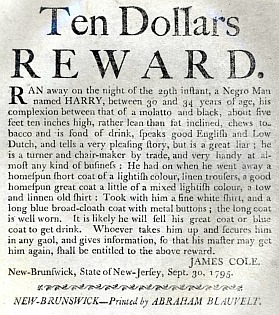 Reward notice for runaway slave in New Brunswick in 1795. Image: New Jersey State Archives Reward notice for runaway slave in New Brunswick in 1795. Image: New Jersey State Archives
New Jersey also had a strong abolitionist community, particularly among its large Quaker population, and indeed long had been a primary route on the Underground Railroad for hiding and protecting fugitive slaves who escaped from the South. Towns like Willingboro along the Railroad's path grew to have substantial African American populations originating from the fugitive slaves who stayed and were later emancipated. -- Election of 1860 Faced with the division of opinion within New Jersey, the state's political leaders initially supported efforts at compromise to avoid war. The election of 1860 reflected the split in the New Jersey electorate over the course that the nation and state should pursue. Charles S. Olden was elected governor as a Republican by a scant 1,600-vote margin, but his Party's presidential candidate, Abraham Lincoln, lost the state by 4,500 votes. In an attempt to strengthen the position of those seeking to keep New Jersey from joining the Southern cause, Lincoln stopped in New Jersey on the way to his inauguration in Washington. He was greeted by a crowd estimated at 25,000 to 75,000 in Newark, along with large turnouts in Jersey City and Elizabeth, followed by a raucous reception by students in Princeton of the College of New Jersey. In Trenton, a 34-gun salute greeted his arrival and he was taken by carriage to the State House to give separate speeches to each house of the Democratic-controlled Legislature reaffirming his commitment to avoid war. As governor, Olden gave cautious support to Lincoln, but also chose to attend the Washington Peace Conference in 1861 initiated by Virginia and opposed by most pro-Union politicians, one of the last efforts to seek a compromise to preserve the Union and avoid an armed conflict. * Abraham Lincoln's Addresses to New Jersey State Senate and General Assembly, February 21, 1861, AbrahamLincolnOnline.org -- Outbreak of War When Fort Sumter was attacked in April 1861, however, the wave of patriotism in support of the Union and against the South led to an early demonstration of the state's willingness to go to war. Enlistments in the New Jersey regiments were three times the level of the state's quota, overwhelming the federal government's resources to supply sufficient numbers of uniforms and weapons for the volunteers. Over the course of the War, the state provided 40 infantry regiments, 5 artillery batteries, and 3 cavalry regiments for the Union, with 5,754 men from New Jersey losing their lives, comprised of 2,578 killed in action or mortally wounded and the rest from diseases, accidents or other causes.. Governor Joel Parker, who was elected in 1862 as a Democrat to succeed Olden, regarded President Abraham Lincoln's suspension of habeas corpus early in the war as an unconstitutional act, and he opposed federal efforts in the direction of emancipation as unwarranted usurpations of state sovereignty. In January 1863, the Legislature adopted resolutions denouncing Lincoln's Emancipation Proclamation as unconstitutional and calling for immediate peace negotiations with the Confederacy, an action branded by soldiers of the New Jersey volunteers as seeking to "tarnish [the State's] high honor and bring upon it disgrace." Parker nonetheless put the fiscal and military resources of his state actively into the battle against the Confederacy. In addition, he sent New Jersey militia to the support of Federal armies at Gettysburg in July 1863 and later attended the dedication of the national cemetery for those who died where Lincoln delivered the Gettysburg Address. The state's emerging industrial sector also provided needed support for the War. Charles Hewitt’s Trenton Iron Works made 1,000 musket barrels a week at the height of the war; textile factories in Paterson and Newark produced hundreds of thousands of uniforms; and former cutlery manufacturers in Trenton converted their production to supply thousands of swords and bayonets. Paterson’s Rogers, Ketchum and Grosvenor Locomotive Works built many of the railroad engines and locomotives that transported troops and supplies; its locomotive The General was the subject of the famous chase in 1862 when it was seized in northern Georgia by Union spies and Army volunteers in civilian clothes and driven to Tennessee to damage the railroad along its path while pursued by Confederates, with seven of the raiders, including its leader James Andrews, later caught and hung as spies. During the course of the War, New Jersey provided over 88,000 men to the Union armies, and was represented in every major battle, with 6,082 enlisted men and 218 officers losing their lives. Before the end of the War, a draft had to be instituted to meet the state's military quotas, an action which brought protests and occasional violence from recent immigrants who could not afford to pay the money allowed to hire a substitute to serve in their place. -- Election of 1864 As late as 1864, New Jersey Copperheads continued to be prominent leaders of the national peace movement opposing Lincoln's policies, securing the Democratic presidential nomination for George McClellan to run against Lincoln. McClellan, who had moved to Orange following his 1862 dismissal by Lincoln as commander of the Union forces, out-polled Lincoln in New Jersey by nearly 7,300 votes, winning comfortably with 53% of the total. Nationally, however, the Democratic ticket headed by McClellan carried only New Jersey, Kentucky and Delaware.
* Presidential Election of 1864: A Resource Guide, Library of Congress 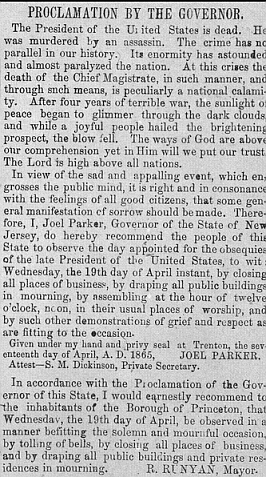 Image: Library of Congress Image: Library of Congress
-- Lee's surrender and Lincoln assassination
While Robert E. Lee’s surrender to General Ulysses S. Grant at Appomattox Courthouse on April 9, 1865 ended major hostilities, celebrations of the Union victory were abruptly ended by the attack by John Wilkes Booth on President Lincoln at Ford’s Theatre on the evening of April 14 and the President’s death the following morning. General Grant, one of several who had declined the President’s invitation to accompany the Lincolns to the theatre, was on his way by rail to the City of Burlington to visit his wife and children when advised of the attack on the President; he continued on to Burlington where he spent the night, returning to Washington the next day. Lincoln’s funeral train from Washington crossed New Jersey on its route from Philadelphia to New York City, with large crowds of New Jerseyans coming out to pay their respects to the President. At Jersey City, the funeral car was placed on a barge and towed by ferryboat across the Hudson from Jersey City to New York City, where it lay in state at City Hall. * Abraham Lincoln and New Jersey, Lehrman Institute * Jersey City hosted Lincoln funeral train 150 years ago, 4/15/2015, NJ.com -- Reconstruction
Even after Northern attitudes toward the South hardened as a result of the President’s murder and the radical wing of the Republican Party pressed for harsh measures of Reconstruction, New Jersey continued to be one of the only Union states urging more moderate policies. The state Legislature initially rejected both the Fourteenth and Fifteenth Amendments guaranteeing the right to vote for former slaves, and New Jersey’s high poll tax was viewed as an effort to limit the numbers of blacks who would be able to afford to vote. Politicians also exploited widespread fears that many freed slaves would migrate to northern states like New Jersey to compete for jobs and drive down wage levels. The New Jersey Democratic Party continued to back reconciliation with the former states of the Confederacy without harsh retribution against the former rebels; it based its policy on New Jersey’s traditional support of the principle of state’s rights, complemented by the state’s economic interests in renewing trade in the supply of Southern commodities and protecting the labor force from competition with freed slaves. In fact, the state’s black population did expand rapidly as a result of Southern migration: from 1870 to 1910, the black population nearly trebled and the 1910 census reported that 58% of New Jersey’s blacks had been born in other states. Despite the continuing anti-black policies of the New Jersey political establishment controlling the Legislature, Southern blacks were attracted to New Jersey by the existing predominantly black communities that had been established during the days of the Underground Railroad and the support that blacks had received from New Jersey Abolitionists, particularly the large and influential Quaker communities. * Jersey Blue: Civil War Politics in New Jersey: 1854-1865 by William Gillette (1999)
* Beneath the Starry Flag: New Jersey's Civil War Experience by Alan Siegel (2001) * New Jersey in the American Civil War, Wikipedia * Native Americans * Exploration and Settlement * British colony
* Royal governance * Path to Revolution * Revolutionary War * Industrialization * Civil War * Post-War Economy & Reform * Woodrow Wilson as Governor * World War I & 1920s * Great Depression * World War II * Post-War Development * 1960s & Richard Hughes * 1970s & Income tax * 1990s-Whitman & Florio * 9/11 & McGreevey Administration * Christie & Corzine * Chris Christie * Phil Murphy |

